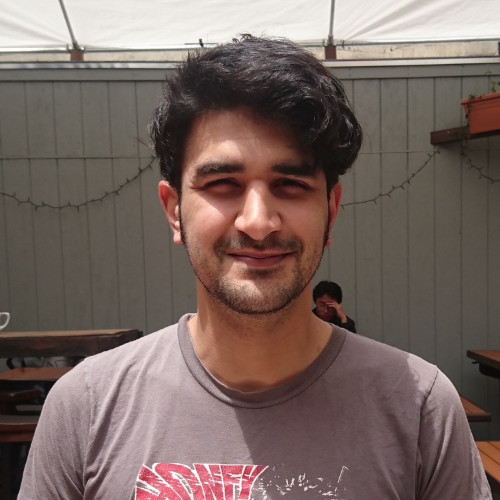Cave In's Stephen Brodsky: "Kurt Ballou said we ruined the Boss PS-3 for everybody!"
The cult alt-rock hero on stripping back his guitar rig and the band's future without Caleb Scofield

In 2017, influential alt-rock vets Cave In began jamming again, breaking the unofficial hiatus they'd been observing since touring 2011's White Silence.
Progress on new material was slow at first, but by the spring of 2018 they had the beginnings of what could be the next Cave In album.
Describing their bassist, Caleb Scofield, as the quality control for the band, frontman Stephen Brodsky explains that by this point, Caleb had pointed to the direction they should go with the as-yet unformed record.
The mission statement that kind of crystallised from Caleb was, 'I think we need to focus on the spacier, heavier elements of the band'
"The mission statement that kind of crystallised from Caleb was, 'I think we need to focus on the spacier, heavier elements of the band,' and basically really hone in on what sets us apart from our contemporaries," says Stephen.
It would be heavier, grander, and take the band back toward their metal-meets-space-rock roots on their debut, Until Your Heart Stops. Also, unlike White Silence, it was decided that the new album would be recorded in a studio, giving it the sheen and polish that had been deliberately absent from White Silence.
Then tragedy struck. A few weeks after the latest writing session, Caleb was killed in a car accident. Whether or not there even still was a band, let alone a record, became moot - and any ideas of a grand, refined studio effort went out of the window as the band grieved.
We spoke to Stephen about the heartbreaking story behind Final Transmission, and how they were able to claw a brilliant album out of the wreckage left by Caleb's passing.
Want all the hottest music and gear news, reviews, deals, features and more, direct to your inbox? Sign up here.
First, our condolences to you and the band, Stephen.
"Thank you, it's much appreciated. I think at this point most people who are familiar with the album and the circumstances, they understand what spawned this record to be what it is..."
Sure. So, if we can ask, how was the material put together, and what were the challenges, apart from Caleb's tragic passing?
I'd say that putting the material together was just starting to ramp up when the situation took a turn for the worse
"I'd say that putting the material together was just starting to ramp up when the situation took a turn for the worse. It seemed like we were just getting some grease on the gears for getting in a room together and playing through the songs that we had written.
"From a technical standpoint, the demo process started out pretty primitive, you know, you can hear [that] on the song Led To The Wolves - which is probably the most lo-fi recording on the album. That was simply a handheld two-track stereo recording device placed somewhere in the room of an old rehearsal space that we had in Allston, Massachusetts.
"That was shortly after White Silence, and you can sort of hear the fumes of the creative aspect of that album in Led To The Wolves. Musically, it's very similar to stuff on that album, it could have been on that record.
"From there, we had an experiment in 2014 where we passed around files to one another of song ideas or riffs, or compositions in various states of complexity, or stuff that was very simple, and the idea was for each member of the band in their respective living quarters to add to it on their own time. That experiment wasn't entirely successful.
"The one track that yielded all four members contributing and playing from that little experiment was the song Lunar Day. We didn't actually finish it until after Caleb passed. We were putting this record away and the last component to complete the picture was needing Adam [McGrath, guitar] to lay down some tracks.
We purposely stacked the record to be hi-fi to lo-fi, as if the whole thing were disintegrating
"Beyond that, we tried to step up the sonic quality a little bit by throwing in a Pro Tools rig, which is something that I've got. Basically I've got this Gator backpack that fits my portable rig, laptop interface, mics, cables, adaptors, headphones; I stuff all that into this padded Gator bag and travel around with it.
"So we started to do a combination of hand-held and Pro Tools by the last session, which was tracks 2,3,4, and 5, so that would be All Illusion, Shake My Blood, Night Crawler and Winter Window. Those songs all had the most mics in the mix, the most separation. If you get familiar with the record you'll probably hear that the sonic quality in those songs is the best outta the bunch."
It's interesting that you say Led To The Wolves was the roughest recording because of circumstance - we assumed that was a deliberate statement due to it being the album closer.
"We purposely stacked the record to be hi-fi to lo-fi, as if the whole thing were disintegrating."
That's a pretty powerful arc for the record.
"[Final Transmission] starts with the clip that Caleb sent to us after the last time we saw him. We decided to leave that as-is, because we felt it was enough of a statement on its own; it didn't need anything else."
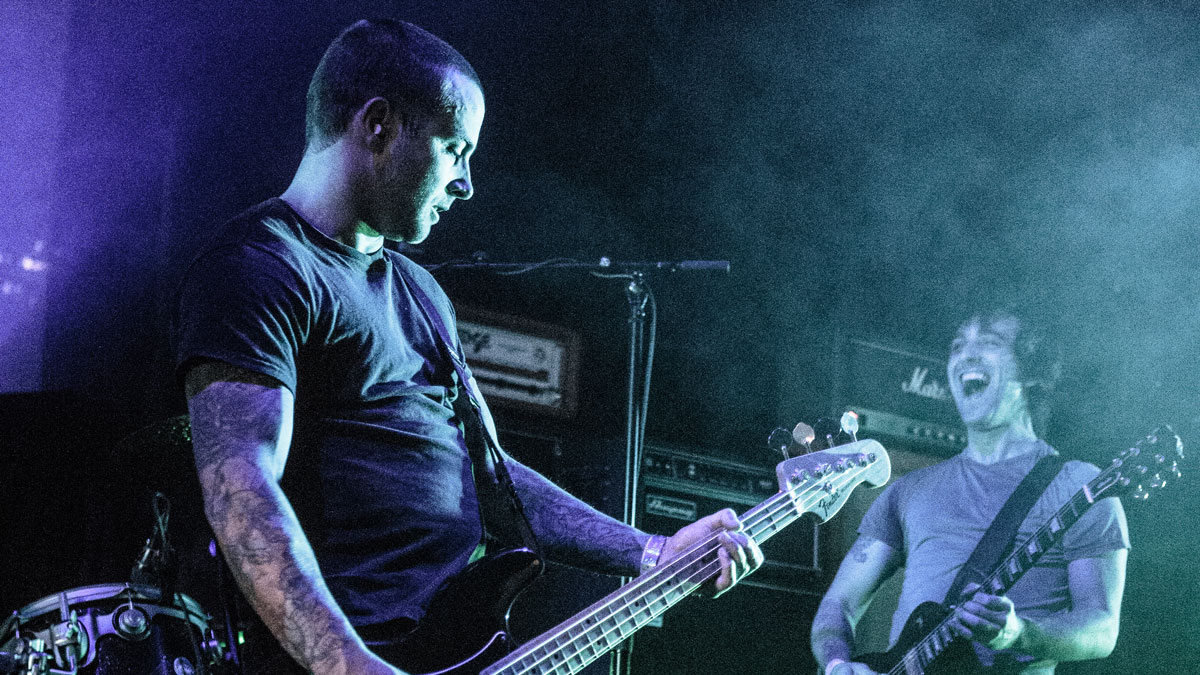
On the recording front, it sounds like you were really pushed for time, even while Caleb was still with us.
"We just had to work quickly; we'd set aside two days to get together and jam. We would do straight run throughs of a song - that's how we knew that a song was... in some shape of a finished state, if all four of us could play through it without having to stop.
"Every song on the record that was done live was basically us playing straight through two takes, [so] you have two to edit from, if one part was wonky, maybe we nailed it on the second take, y'know?"
So these demos were worked up into the album, rather than the original studio project as envisioned. How did you complete the record from the material you had recorded?
We realised that this was going to turn into a record we would be comfortable with people hearing, from a sonic standpoint
"When it came time to mix, we definitely were all in agreement to hand off the project to Andrew Schneider, who worked out of a studio in the city. He [decided to] add drum samples, and project the music into a room for more natural reverb and ambience, because the place we recorded was all carpeted floors and sheet rock, your average rehearsal space.
"That's when we realised that this was going to turn into a record we would be comfortable with people hearing, from a sonic standpoint."
Those touches I guess made a big difference in terms of the polish of the album, even if it wasn't what you originally had in mind...
"The idea was always to take this stuff into a studio and make an album, y'know? Even Caleb was very specific about that. The last record we [did], White Silence, was done entirely in a rehearsal space, and there are some great songs on that record, but sonically I don't think that it's something the band 100 per cent was behind.
"It was an experiment, and there were plusses and minuses to it. There's something to be said for the sound of a band rehearsing in a room that they're very comfortable in, and I'll say that much about Studio 52 in Allston, where a lot of Final Transmission was recorded.
"We're obviously very comfortable in there, and I think you can hear that. We've also been a band for 20 years - or, at least that line-up, with Caleb in the band. There's just something that happens when four people play together, and that becomes a part of the sound."
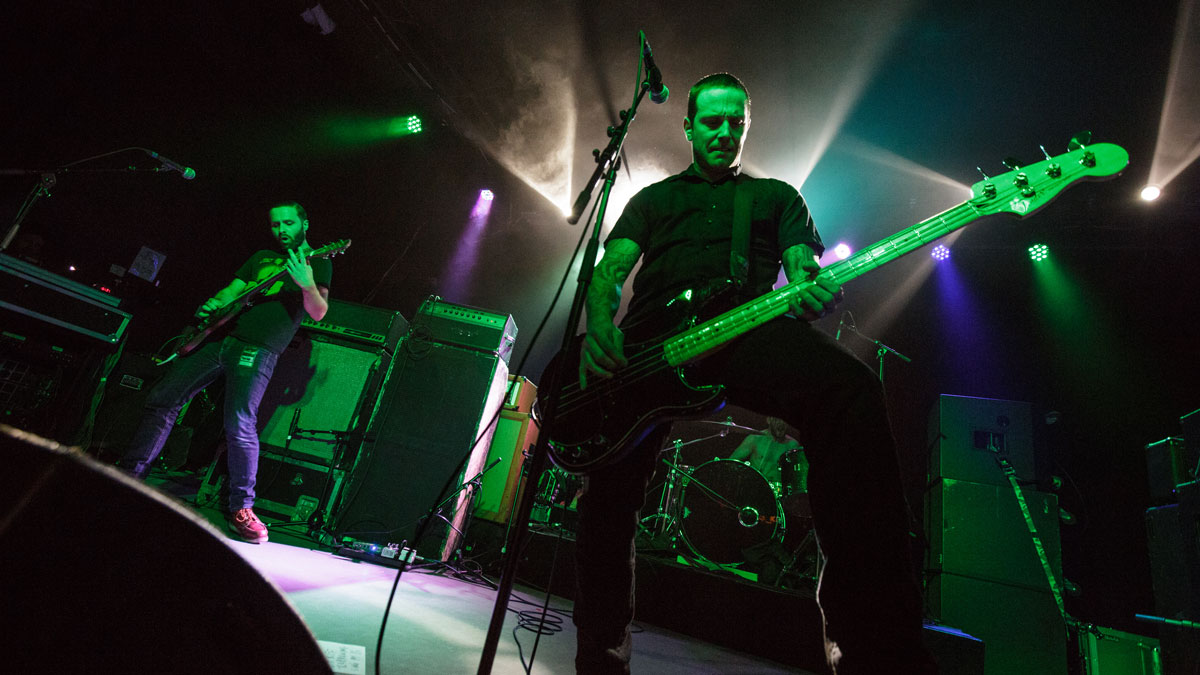
Do you think that limiting your options can help the creative process? In a way, recording live on White Silence and the tragic circumstances surrounding Final Transmission have placed limitations on both.
"Oh absolutely, just from an engineering standpoint, sometimes it's healthy to throw in some boundary that locks you into a decision making process.
"That can be recording live and setting things up in such a way that there's bleed, and treating the band like it's one singular track... Sometimes I like to work in that [way] - I think it makes things a little bit more interesting, and it accelerates the manifestation of whatever musical vision it is that you're trying to achieve."
That totally makes sense.
"I get impatient sometimes... I like to hear things played back sort of immediately, because to me that's more about the song, and more about the relationships of the members in the musical unit, and how they play together, and the chemistry that's going on. It's more about that than building a sonic experiment, y'know?"
So, from a guitar standpoint, what would you say is different about Final Transmission?
Sometimes you get that doppler effect where the hitting of the string bends it up slightly in pitch… like a helicopter crashing into a mountain made of mashed potatoes
"I think there were some significant differences on this album than the last record. One of them being guitar tunings.
"The first five tracks on the album have a specific tuning that Caleb came up with that's based off an Open G, but there's the wildcard low C thrown into the mix. It's this tuning that we like to call 'secret C'...
"That's the first time we've used that tuning in Cave In on an album; it has this specific sweet, major-sounding quality to it but there's a heaviness to it with that open C, and that's the wildcard.
"Winter Window has a tuning that's in drop A; it's not just drop A, but the B string is dropped down a whole step so you have three different As in there at three different octaves. Drop A tuning you can play in the style of drop D, and it's a tuning that a lot of my favourite Neurosis songs are in.
"If you hit the string hard enough, sometimes you get that doppler effect where the hitting of the string bends it up slightly in pitch so it has this effect of, like, a helicopter crashing into a mountain made of mashed potatoes [laughs]."
Does that mean you have to use a different string gauge?
I try to keep a light load, and I end up borrowing quite a bit of gear just for the ease of transportation. For me, that kind of keeps things interesting
"We generally use bottom-heavy strings on the guitars, and even with drop B and drop A tunings, sometimes the standard 52 gauge is not quite thick enough.
"For real anal-retentive players, that would probably drive people crazy, but for the rock 'n' roll aspect of Cave In, having things a little bit unclear at times is perfectly acceptable."
Did the guitars and amps you used change?
"For me it did, because since the last album I've moved to Brooklyn, and when I travel up to Massachusetts, I try to keep a light load, and I end up borrowing quite a bit of gear just for the ease of transportation. For me, that kind of keeps things interesting.
"I ended up using Adam McGrath's Custom Les Paul on a bunch of songs, and I think Strange Reflection and Lanterna have the Les Paul and an old-school Sunn 1000S guitar head that I played through, which was generally a lot dirtier than the sounds that I go for.
"I also used this as an opportunity to try some of the pedals that my friends have been making. Kurt Ballou [of Converge] has been sort of experimenting with various different pedal designs over the last few years."
Kurt makes some cool stuff. What did you use? A Brutalist?
"On those particular songs I was playing this pedal that he called the Red Barn. The Red Barn was an actual barn in the suburbs of Massachusetts that all of our bands at some point or another played shows at.
"It wasn't anything special; you'd go inside and it was this brightly lit barn, with no stage, and a back room, and that was it. That was where a lot of all ages shows happened growing up, and one early aspiration was to be able to play the Red Barn somehow. That was really getting your foot in the door for the local hardcore punk scene [laughs].
"So I used the Red Barn pedal, but I'm not sure Kurt made more than just that prototype. It's a really high-powered fuzzy overdrive. I think he modelled it after a Boss OS-2, which as far as distortion goes, that's probably one of my favourite gadgets that I've ever come across."
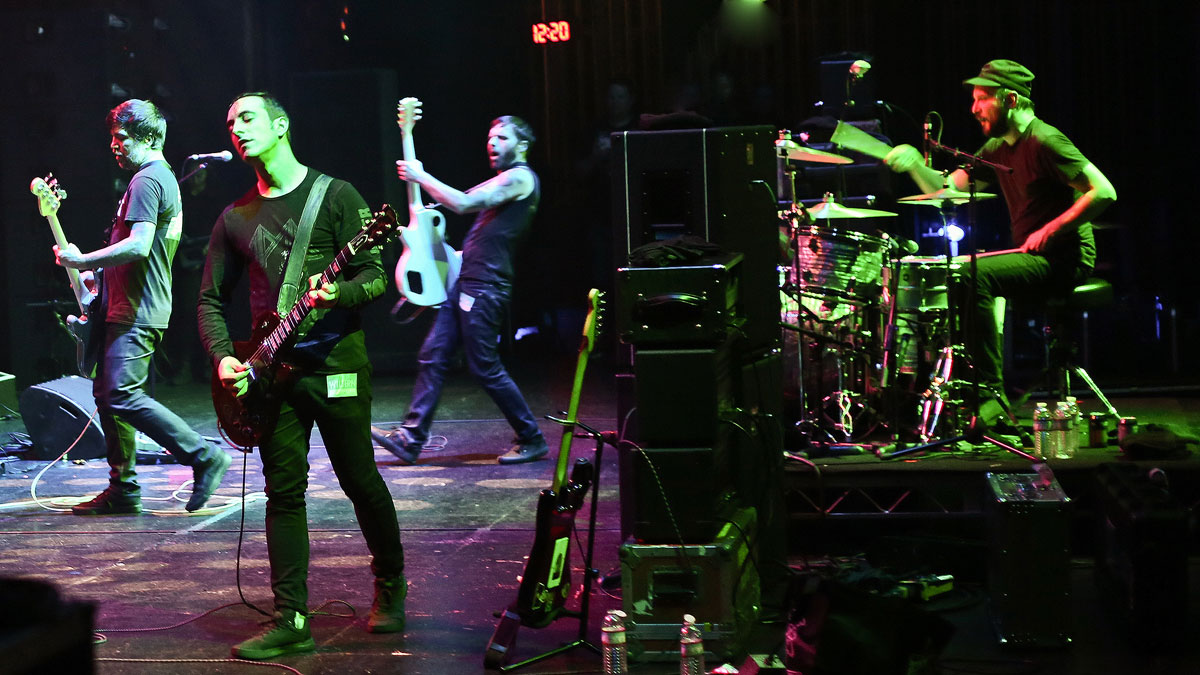
What was Adam using?
"We're major Marshall fans; the Jupiter record was recorded using an 800 and a JMP; [on Final Transmission] for the first time he was playing a Fender [Strat]."
Do you still have your Marshall?
"You know, I would love to own another Marshall - I can't remember what happened to mine! I still have my Sunn Model T from the early-to-mid '70s that just won't quit on me. I can't even tell you the last time I serviced the tubes on it."
What about your wild Dunable V from Mutoid Man? Did that get used?
I have a fallback of pedals that work for me in a live setting that are tried and true and aren't going to trip me up...
"Dunable is this great company out in California that has been doing custom builds of these really cool shapes, and I worked with Sacha on this Flying V, that I think was part of the first wave of the Asteroid, which is the name of his Flying V.
"It was cool, though; we sort of modelled the specs on it after guitars that he's known me to play in the past. There's some mahogany in there. The humbucker at the bridge is just for, like, screaming powerful mids to punch you in the chest.
"I also have a Gibson S-1 that I hot-rodded with a humbucker in the bridge, and the neck I kept single coil - that was kind of cool because at the flip of a switch I can go from a real twangy Fender sound, something that cuts and bites, to screaming humbucker, punch you in the chest midrange. So we did the same with the V.
What guitars were you using on previous records?
"I think maybe on White Silence I was playing my Les Paul, which is a Les Paul Studio that was bought brand-new in 1993 by my dad. He got it for himself, I think, as his last hurrah for being wrapped up with his rock 'n' roll, youthful self...
"I think by 1996 he saw that I was using the guitar far more than he was, because I'd have to ask him, 'Hey dad, can I bring your Les Paul to the Knights of Columbus for a show tonight?'
"At some point, it was very evident that I was using it far more than he was, and he gifted it to me. I still have that guitar, and play it quite a bit, but as I get older I'm more hesitant to travel with it, because of the personal value."
That's understandable. So what does make it out on the road with you?
"I have a fallback of pedals that work for me in a live setting that are tried and true and aren't going to trip me up... it can take you out of the headspace in a negative way.
"As I get older, I don't need anything standing in the way of me getting my fingers to do what they're supposed to do, playing all these songs that I wrote as a teenager, you know, and trying to remember lyrics and such!
Kurt Ballou had a very efficient fly rig at ArcTanGent Festival the other year. Have you been swapping tips?
"Efficiency is super-important, in this world of excess baggage fees. You've really gotta think about how to keep a whole set of emotions and feelings that you're trying to convey to under 50lbs. [laughs]"
You're well-known for using the Boss PS-3. How did you come across that signature sound?
I'd like to think that there's a future with this line-up, and there's still some unfinished business with the creative goals of Cave In
"Speaking of Kurt Ballou, he seemed genuinely upset at Cave In at one point, because the pedal that he now refers to as the 'Caveinator', which is the PS-3 - well, look, Kurt records bands for a living, so when they come in and say they want a Cave In-type sound, he basically has to rig up the 'Caveinator'.
"Kurt, being somebody that's a songwriter and a wonderful musician in his own right, he's like, 'You guys ruined that pedal for everybody.'"
No matter what Kurt says, we saw one on his fly rig.
"[Laughs] It's interesting; there was a sound in my head from a very early age, once I started getting into playing music that I wanted to try to emulate, and I feel very lucky that I came across it, and that it's been as useful and as fruitful as it has been.
"Interestingly enough, Adam these days has been leaning more towards the [Mr Black] Eterna pedal. It's got very PS-3-like qualities to it, but it's got some other things going on... as for me, I still haven't found anything that does it quite like the PS-3."
So back to the band, what's next for Cave In? Is there still a Cave In?
"Well, everyone's feeling pretty good about the way that we've put the wheels back on the band, given the situation. It's brought us closer as friends, and I think the work wasn't simply for pushing this record.
"I'd like to think that there's a future with this line-up, and there's still some unfinished business with the creative goals of Cave In, but it's definitely too early to consider... we really need to decompress from this whole situation.
"We were working on this stuff from not too long after Caleb passed away, to finish it up with the idea that we've gotta help the family, y'know?"
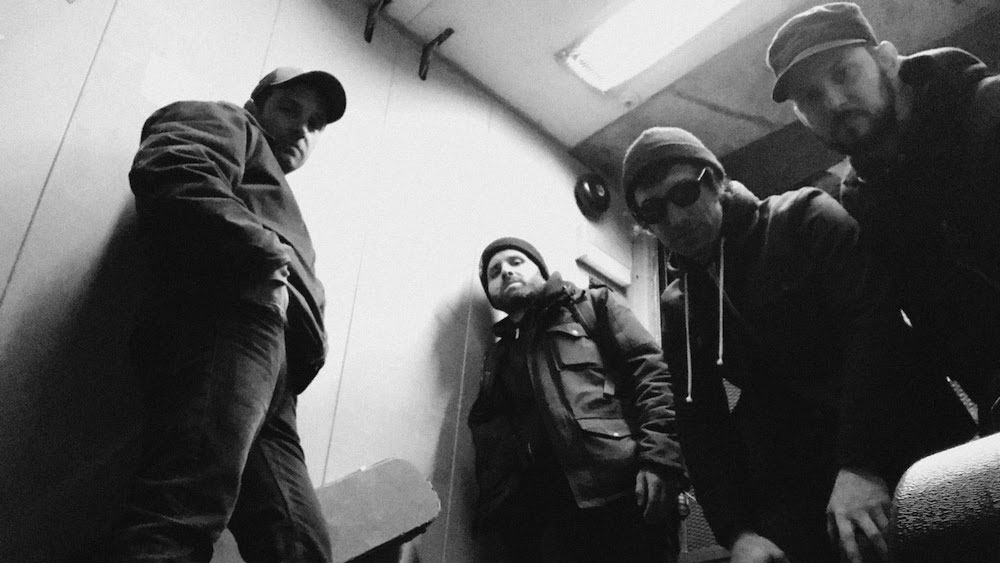
Do you feel like the direction Caleb suggested for what became Final Transmission means that you have a possible direction to pick up on in future?
"There were quite a few song ideas that were passed around between the band leading up to Final Transmission, while Caleb was still alive - song ideas that he heard, that he was like, 'Oh, I think that's really good', or 'I like this' or 'I think we should work more on that.'
There are more ideas in the can for possible future recordings or ideas to develop into something else that Caleb was into
"That was a role of his, in a way, for the band, was quality control. We knew that if he was into something, then it was definitely worth pursuing. That solidified our decision to work on these nine tracks - the ones he played on. We knew that, 'Okay, Caleb took the time and effort to play on these tracks - let's build them up.'
"That being said, there are more ideas in the can for possible future recordings or ideas to develop into something else that Caleb was into. I think it would be a smart move on our part to go, 'Well, if we're gonna explore more stuff down the line, let's consider this other material that he didn't play on, but that he had a positive reaction to.'
With that, what motivates you to continue making music, and what do you love about music?
"In light of recent events, I love the healing nature of music, and I think I've found a greater appreciation for that, more than ever.
"Not just for myself, but I've seen how it reaches out to family and friends and fans - so in light of a really horrible situation, it is incredible that myself and my friends could get together to do things that bring healing and help and security...
"Music continues to surprise me, and I think as long as it does, I'll always gravitate towards it, I'll always have an interest in it - as a listener and as a creator."
Final Transmission is out now via Hydra Head.
Alex Lynham is a gear obsessive who's been collecting and building modern and vintage equipment since he got his first Saturday job. Besides reviewing countless pedals for Total Guitar, he's written guides on how to build your first pedal, how to build a tube amp from a kit, and briefly went viral when he released a glitch delay pedal, the Atom Smasher.
